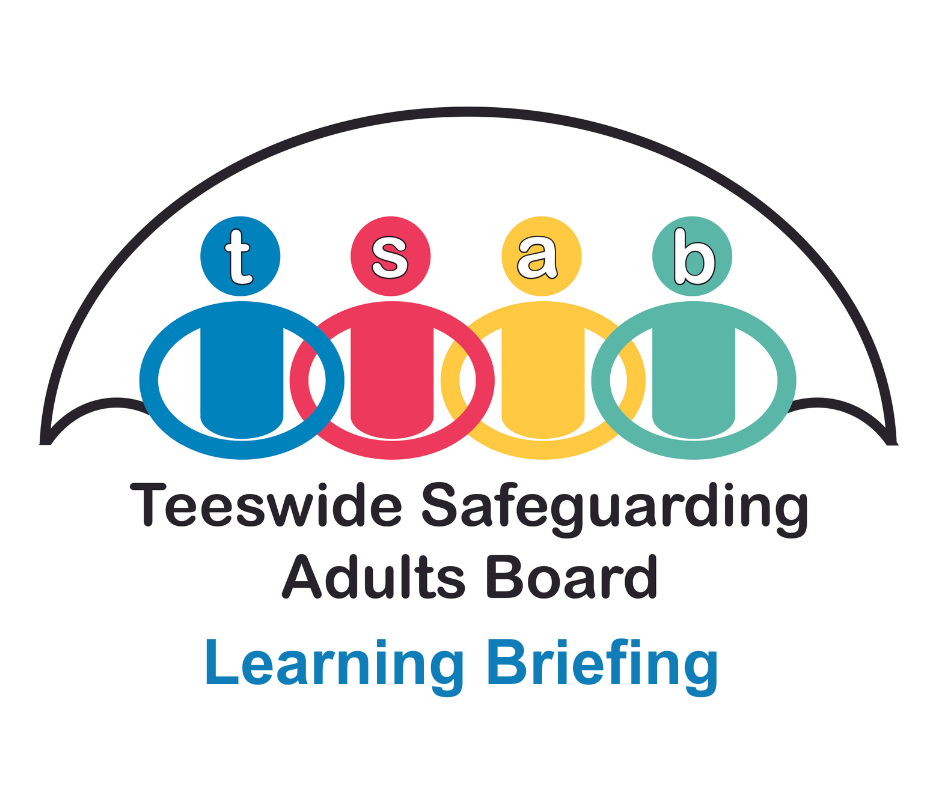
1. Background
As the Teeswide Safeguarding Adults Board (TSAB) has considered a number of Safeguarding Adults Review (SAR) Notifications since 2015 where alcohol dependency was a factor it was agreed that the TSAB would adapt the Somerset Safeguarding Adults Board Learning Briefing (with their permission) which outlines the legislation that can be used to support staff who are working with people who are dependent drinkers.
Alcohol Change UK have produced a guide on ‘How to use legal powers to safeguard highly vulnerable dependent drinkers.’ This guide provides an introduction to legislation that can be applied to chronic, highly vulnerable, dependent drinkers so as to improve outcomes for them, their families and their communities. The guide also outlines the limits of these legal frameworks and when they should not be used. TSAB also considered this guide and subsequently commissioned Mike Ward from Alcohol Change to provide training on Vulnerable Dependent Drinkers. This learning briefing sets out the legislation and considerations to support work with dependent drinkers.
2. Myths and Misconceptions
The guide outlines many misconceptions including:
- If someone says they do not have a problem and do not want help, there is nothing we can do
- If they are choosing to live like this, or like living like this, we can not define them as vulnerable
- They have mental capacity so they are not vulnerable or self-neglecting and there is nothing we can do
- A person has the right to make unwise decisions
- Alcohol dependency is not covered by the Mental Health Act; mental health services do not need to assess someone if their main problem is alcohol
- Assessment is impossible if they never turn up for appointments
3. Mental Capacity
There are many published SARs that identify that dependent drinkers’ contact with support agencies can be sporadic and ongoing engagement with services may not be maintained. Adults may be deemed to have capacity to make decisions but may or may not be intoxicated when assessments take place: alcohol dependency leads to changes in the brain associated with impaired executive functioning. This may impact on the ability of the adult to effectively engage with services and if combined with other issues, such as domestic abuse, mental capacity is possibly severely impacted.
4. Key Legislation
The Care Act 2014 does apply to people with alcohol problems and includes self-neglect as a form of abuse which applies to people who are dependent on alcohol. TSAB have developed Self-Neglect Guidance to assist practitioners in working with people who self-neglect.
The Mental Capacity Act can be used with people who are impaired by the effects of alcohol. There are challenges of applying this Act to chronic dependent drinkers because of a lack of specific guidance.
The Mental Health Act should be used as a last resort. It specifically excludes people who are solely dependent on alcohol, but there are circumstances in which the Act may be used with people who have other mental or behavioural disorders arising from alcohol dependency.
5. Other Frameworks
There are other pieces of legislation that can be used when working with vulnerable, dependent drinkers, such as the Human Rights Act and various pieces of environmental health legislation.
The four Tees Local Authorities have arrangements in place to manage high risk safeguarding cases, including those where self-neglect is evident.
The High Risk Adults Panel works in collaboration with a core group of multi-agency professionals and extended members to reduce/remove or manage the risk of ‘our’ most vulnerable individuals who are identified as being complex and at high risk of harm. Referrals will be made where other multi-agency processes have not been successful in reducing risk or harm and where a strategic approach to case oversight is required.
6. What to do now
- Reflect on how the above themes link with your direct work with adults, families and other professionals
- Think about how you can adapt your practice based on this learning
- Discuss within your team meetings and consider any team learning and development needs
7. What to do next
Check out this information and share with your teams:
- How to use legal powers to safeguard highly vulnerable dependent drinkers
- Identifying and addressing cognitive impairment in dependent drinkers
- The TSAB Self-Neglect Guidance
- TSAB SAR/LLR cases
- The process for referring to the High Risk Adults Panel (HRAP)
- Safeguarding E-Learning (including Self-Neglect and Dementia Awareness), Self-Neglect Workbook and Safeguarding Adults training courses via the TSAB Website
- Look at some relevant SARs: Alan and Howard
You can also find up to date, policies, procedures and guidance including: Inter-Agency Safeguarding Adults Policy and Procedure, Decision Support Guidance, Mental Capacity Act and Deprivation of Liberty Safeguards Policy, Mental Capacity Act Guidance and Multi-Disciplinary Team Guidance on the TSAB website.
Published: November 2022
Reviewed: August 2024